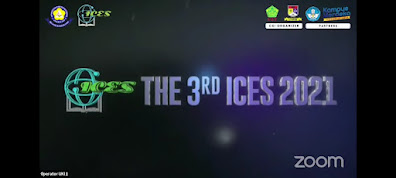On Wednesday 18, 2021, a webinar on The 3rd INTERNATIONAL CONFERENCE ON EDUCATION AND SCIENCE was well held. where there are several teachers or lecturers who follow and share some of the activities they implement in the schools they teach and also some of the teachers tell some journals that they research for teaching in this covid condition and how to overcome them.
This webinar has the theme "Research and education sustainability post-COVID-10 in Asian context." This event was hosted by our own lecturer, Mam Asri, and also for the moderator of the event, Sir Lamhot and for room 1 it was moderated by Sir Male.
What is interesting about this educational discussion is the speaker Dr. Associate Professor Wenli Chen as Head of Learning Sciences and Assessment (LSA). in his explanation, he presented material on Supporting Effective Collaborative Learning In the Classroom: Technological and Pedagogical design. he told about the Singapore Educational Technology Plan (2020-2030), from here he explained the vision of future teaching techniques as follows:
- For first in the vision there is self-directed whereby developing pedagogy, tools, and structures to help students develop intrinsic motivation and take ownership of their learning.
- Personalized where teachers can create learning experiences that match the pace and meet the needs of each child.
- Connected were developing collaborative learning experiences and connecting student learning with society and the world.
- Public Relations-centred, by utilizing a data-based understanding of how students' interests, attitudes, and motivations can optimize learning.
and also discusses MOE's Personalized Digital Learning Program. here Teachers work with Designers and Facilitators of meaningful teaching-mediated learning experiences.
where the first way we change the way the class works itself to be more effective with the topic funnel model is understanding and they as students try to communicate this topic and discuss in a way they need to post their own opinions and other members present the opinions of other members.
The second, finding different ideas and opinions where other members go to other groups and they see the results of other groups and they will learn the differences in opinions and opinions.
and third, by using the funnel model (chorong) the teacher will try to ask all of their opinions, where here the function is to collaborate and they will share their own ideas and opinions, Students not only know the answer but argue and have to provide evidence for their argument, where in this argument students can collaborate with other members by playing a role in providing arguments or opinions with the help of technology in implementing them.
where this model has been tested by 15 teachers, based on RPs and the applicable curriculum, and computer-based arguments when collaborating.
The third is the topic of the Computer Support Collaborative Argument.
as above, it can be understood that to create good education and teaching, various methods must be used, especially the chorong method, here is how we use computers or technology as a tool to carry out this method well again.
for the technique itself where students have to argue and give explicit reasons for their opinions and arguments then the teacher and students can give an assessment of it with the "Learn to Argue" and "Argue to Learn" systems.




Komentar
Posting Komentar